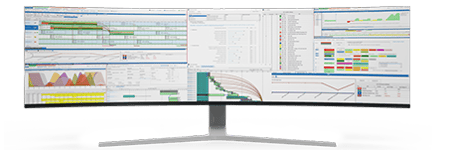Improving Efficiency through Automated Reporting in Pharmaceutical Supply Chains
Supply chain managers face constant pressure to optimize processes, improve accuracy, and ensure seamless production. One area with substantial room for improvement is reporting—specifically, transforming labor-intensive, manual reporting tasks into streamlined, automated processes.
Automated reporting, when integrated with advanced software like PlanetTogether and enterprise resource planning (ERP) systems such as SAP, Oracle, Microsoft, Kinaxis, or Aveva, can lead to significant gains in productivity, accuracy, and compliance.
This blog will explore the advantages of automated reporting within pharmaceutical manufacturing, focusing on how PlanetTogether’s integration with leading ERP systems supports this transformation, leading to a leaner, more efficient supply chain.

Automated Reporting in Pharmaceutical Supply Chains
Pharmaceutical supply chains are among the most complex, largely due to regulatory requirements, the need for precise production tracking, and strict quality controls. Traditionally, reporting in this sector has involved manual data entry and consolidation—a tedious process that’s prone to error and delays. This approach becomes especially challenging when dealing with vast amounts of data across multiple production facilities or geographical regions.
Automated reporting resolves many of these challenges by:
Reducing Errors: Automated systems pull data directly from source systems, minimizing the risk of human error.
Saving Time: Reports are generated in real-time, reducing the time required for manual entry and validation.
Improving Compliance: Automated reports can be customized to include regulatory requirements, making it easier to comply with Good Manufacturing Practices (GMP) and other standards.
Increasing Visibility: With automated reporting, supply chain managers gain immediate access to accurate, real-time data, enabling faster, more informed decisions.
![]()

How PlanetTogether and ERP Integration Supports Automated Reporting
PlanetTogether’s Advanced Planning and Scheduling (APS) software is designed to enhance operational efficiency by enabling real-time visibility and control over production schedules. When integrated with ERP systems like SAP, Oracle, Microsoft, Kinaxis, or Aveva, PlanetTogether provides a seamless platform for data exchange and reporting, helping pharmaceutical supply chain managers gain deeper insights into every stage of production and distribution.
Data Consolidation Across Systems
One of the primary benefits of integrating PlanetTogether with ERP systems is the consolidation of data from disparate sources. In many pharmaceutical companies, various departments use separate tools for scheduling, production, inventory, and financial management. By integrating PlanetTogether with an ERP system, data from these siloed systems can be unified into a single source of truth, enabling consistent reporting and eliminating redundancies.
For example:
Inventory Management: Real-time inventory data from SAP or Oracle ERP systems can be synchronized with PlanetTogether to reflect accurate stock levels, expiry dates, and batch locations.
Production Scheduling: Production schedules created in PlanetTogether can automatically adjust based on real-time demand forecasts and resource availability from ERP systems.
Financial Data: Cost data from ERP modules in SAP or Microsoft Dynamics can be linked to production data in PlanetTogether, enabling financial performance tracking in line with production output.
Real-Time Data Synchronization for Faster Decision-Making
Integration between PlanetTogether and ERP systems facilitates real-time data synchronization, which is essential for automated reporting. With real-time data, supply chain managers can generate reports that accurately reflect current operations and respond quickly to changes in demand, supply delays, or production issues.
For instance, if a batch fails a quality inspection, this information can be immediately reflected in PlanetTogether and communicated to the ERP system. This quick data exchange allows supply chain managers to reallocate resources, adjust schedules, and minimize delays while maintaining transparency across the organization.

Benefits of Automated Reporting for Pharmaceutical Supply Chain Management
Automated reporting offers several advantages for pharmaceutical supply chain managers, particularly in areas of compliance, performance monitoring, and predictive analysis.
Improved Compliance with Regulatory Standards
The pharmaceutical industry is highly regulated, with strict requirements from agencies like the FDA and EMA. Automated reporting, facilitated by PlanetTogether’s integration with ERP systems, enables accurate, real-time tracking of production metrics and quality standards. Reports can be customized to align with specific regulatory requirements, ensuring all necessary data is collected and presented in the required format.
For example, if a supply chain manager needs to submit a report on batch genealogy for traceability, automated reporting can quickly compile data from PlanetTogether and the ERP system, offering a complete history of each batch from raw material sourcing to final product distribution. This level of reporting precision not only simplifies compliance but also reduces the risk of non-compliance fines and recalls.
Enhanced Performance Monitoring
With automated reporting, supply chain managers can closely monitor key performance indicators (KPIs) such as lead times, production cycle times, and yield rates. PlanetTogether’s integration with ERP systems allows for automatic tracking of these KPIs across different stages of the supply chain.
Consider a scenario where a pharmaceutical company aims to improve its yield rate. Automated reporting allows the supply chain manager to access real-time yield data and identify bottlenecks or inefficiencies in the production process. By analyzing these reports, managers can make data-driven decisions to optimize resources, enhance efficiency, and ultimately improve yield rates.
Predictive Analytics for Proactive Supply Chain Management
Automated reporting can also play a crucial role in predictive analytics. By integrating PlanetTogether with ERP systems, pharmaceutical manufacturers can leverage historical and real-time data to forecast future demand, anticipate stockouts, and mitigate potential disruptions.
For instance, by analyzing historical sales and production data, PlanetTogether and ERP systems like Kinaxis can help supply chain managers forecast demand for certain medications. This predictive capability allows managers to proactively adjust inventory levels, production schedules, and supply orders, reducing the risk of stockouts and production delays.

Overcoming Common Challenges in Implementing Automated Reporting
While the benefits of automated reporting are clear, implementing it in pharmaceutical manufacturing comes with certain challenges. Here’s how integrating PlanetTogether with ERP systems can help address these challenges.
Data Quality and Consistency
One of the main challenges in automated reporting is ensuring data quality. Inaccurate or inconsistent data can lead to incorrect reports, which can be detrimental in a highly regulated environment. By integrating PlanetTogether with ERP systems, companies can set up data validation protocols to ensure that only accurate, reliable data is used in reports. This integration also minimizes the need for manual data entry, reducing the risk of human error.
Data Security and Compliance
Pharmaceutical companies are required to protect sensitive data, particularly patient and product data. Automated reporting processes must comply with data security regulations such as HIPAA and GDPR. ERP systems like SAP and Microsoft Dynamics offer robust security features that can be integrated with PlanetTogether to ensure that automated reporting complies with these regulations, safeguarding sensitive data.
Change Management and Training
Transitioning to an automated reporting system requires a cultural shift and investment in training. Integrating PlanetTogether with familiar ERP systems can ease this transition, as employees can continue to work within systems they already know. PlanetTogether’s user-friendly interface and training resources can further support this transition, helping employees understand and adapt to the new reporting processes.

Steps for Implementing Automated Reporting with PlanetTogether and ERP Integration
To successfully implement automated reporting in pharmaceutical supply chains, consider the following steps:
Assess Data Sources: Begin by identifying all data sources that need to be integrated, including production schedules, inventory records, quality control data, and financial records.
Choose the Right ERP Integration: Decide on an ERP system that aligns with your company’s needs—whether it’s SAP for its robust modules, Oracle for flexibility, or Microsoft Dynamics for ease of use.
Develop a Reporting Framework: Work with PlanetTogether and ERP consultants to create a reporting framework that includes data validation protocols, report formats, and security requirements.
Conduct Training and Change Management: Implement training sessions for employees, helping them understand the new system and how to interpret automated reports effectively.
Monitor and Refine: Continuously monitor the performance of the automated reporting system and make adjustments as needed to improve data accuracy and reporting efficiency.
Automated reporting is a transformative tool for pharmaceutical supply chain managers. When integrated with PlanetTogether and ERP systems like SAP, Oracle, Microsoft, Kinaxis, or Aveva, automated reporting provides accurate, real-time insights that support faster decision-making, improved compliance, and enhanced operational efficiency.
By embracing this technology, pharmaceutical manufacturers can streamline their supply chain processes, meet regulatory requirements, and ultimately drive better outcomes for patients and stakeholders alike.
Are you ready to take your manufacturing operations to the next level? Contact us today to learn more about how PlanetTogether can help you achieve your goals and drive success in your industry.
Topics: PlanetTogether Software, Real-Time Data Synchronization, Integrating PlanetTogether, Faster Decision-Making, Pharmaceutical Manufacturing, Improved Compliance with Regulatory Standards, Adoption of Predictive Analytics, Enhanced Performance Monitoring, Data Consolidation Across Systems, Proactive Supply Chain Management




















LEAVE A COMMENT